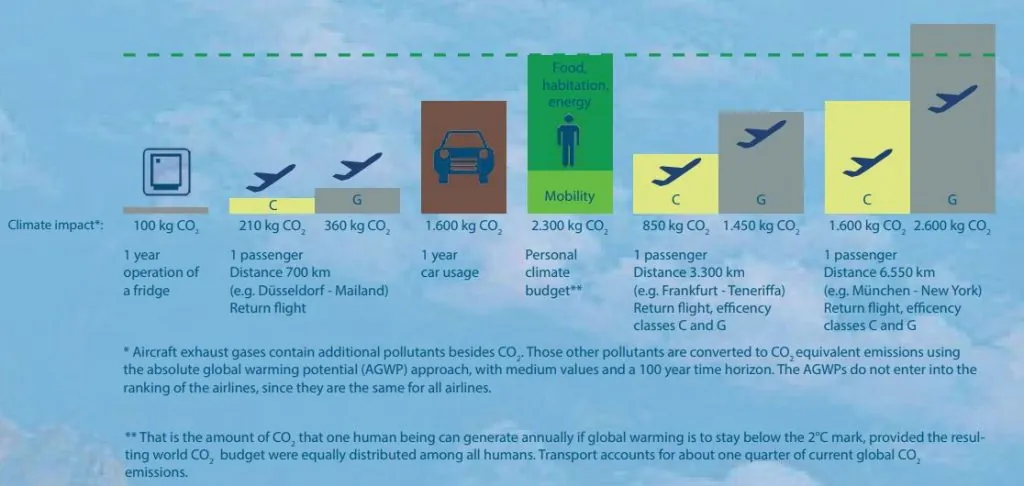In This Section
- Home
- About
- Student Led
- Research Informed
- Practice Focused
- Resources
- Case Studies
- Green Labs Community
- News
- Office of Sustainability and Climate Action
The Conundrum of Academic Air Travel
UCC’s most recent carbon footprint calculation estimated that we release over 32,000 tonnes of carbon dioxide equivalent into the atmosphere every year. This is potentially an underestimate, and from August, a new research project, under the supervision of Dr Niall Dunphy (CPPU), will work to refine this calculation. Nevertheless, we are certain that emissions from commuting and business travel constitute a significant portion of our footprint. This isn’t just the case for UCC; it’s replicated in universities across the globe (1).
The impact of transport (and in particular flying) on climate breakdown is well documented. Direct emissions from aviation account for about 3% of the EU’s total greenhouse gas emissions and it’s estimated that, by 2050, this could grow by anywhere from 300-700% (2). As an individual, one transatlantic flight could exceed your total annual carbon “budget”.

So what can be done? It is often argued that researchers need to travel in order to build their professional network and therefore progress in their careers. However, a recent study from Canada found no relationship between air travel and academic productivity (3). There was a relationship between air travel and salary though. If you are attempting to reduce the amount of flying that you do, and think it should be possible to participate in meetings remotely, then take a look at the facilities currently available in UCC through Audio Visual Media Services. What do you find are the biggest barriers to remote participation? Let us know, so that we can work to find a solution.
Aside from not flying, there are some decisions you can take to reduce the impact of your flight:
- Business class air travel has about twice the carbon footprint of economy class (4).
- The more times you take off, the more fuel you use (5). Flying direct may be more environmentally friendly.
- Not all airlines are the same. Some airlines have been calculated to be more efficient than others (6).
As an institution, however, what should UCC do?
As universities, our final “product” is the knowledge that we create and instill in our students. “Transporting” this knowledge across the globe is part of our what we do. As an island nation, flying is often our only means of making journeys to mainland Europe. But research institutions are being called on to lead by example in putting a stop to flying (7). In addition, surveys carried out at universities have shown that many staff don’t want to fly in the first place and highlight the strain that travel places on their already high workload (8).
Being a Green Campus means working together to make improvements to our environmental footprint. So we need your help in identifying steps forward to address this issue and identifying what might work in our specific context. Here’s what’s happening in other institutions:
- Some universities are implementing travel policies that look at whether travel is absolutely necessary, disclosure of annual flying activity and prioritisation of video-conferencing (9).
- UCLA and the University of Maryland charge departments a mitigation fee based on the amount of air travel undertaken, while others suggest a departmental flying “budget” (10).
- Many individual academics are signing a “flying less” petition, calling on universities and professional associations to work to reduce the need for academic travel (11)
- Leading by example, Hamburg University of Applied Science are convening a climate change conference (Climate2020) that is entirely online (12).
Have you already taken steps to reduce the amount of flying that you do, both personally and professionally? If so let us know what you have done, and what impact it’s having.
We are unlikely to ever put an end to all travel, so is offsetting the answer?
Offsetting is sometimes necessary when there is no other realistic alternative to an environmentally damaging activity. However, offsetting is a highly contentious area. Of particular concern is the fact that wealthier countries are able to purchase offsets in less well off nations and continue to emit more than their fair share of carbon dioxide into the atmosphere (13). If we decide to offset some of our emissions, then care must be taken to ensure it is done in a fair and equitable way.
Over the next number of months, we will be exploring this issue in more detail. If this is something that you feel strongly about, have ideas or particular expertise that could contribute to tackling this issue, then please get in touch.
References
- https://hiltner.english.ucsb.edu/index.php/ncnc-guide/#intro
- https://www.sciencedirect.com/science/article/pii/S0959652619311862
- http://documents.worldbank.org/curated/en/141851468168853188/pdf/WPS6471.pdf
- https://www.nasa.gov/wp-content/uploads/2020/07/green-light-for-green-flight-tagged.pdf
- https://www.atmosfair.de/wp-content/uploads/aai2018-englischfarbe_final_mn.pdf
- https://theconversation.com/researchers-set-an-example-fly-less-111046
- https://green.uw.edu/sites/default/files/docs/final-report-uw-air-travel.pdf
- https://www.concordia.ca/content/dam/artsci/geography-planning-environment/docs/Flying_Less_Policy_GPE_June1_2019.pdf
- https://www.wired.com/story/climate-scientists-take-the-train/
- https://academicflyingblog.wordpress.com/2015/10/17/a-petition-calling-upon-universities-and-professional-associations-to-greatly-reduce-flying/
- https://www.irishtimes.com/news/environment/state-s-use-of-public-funds-to-buy-carbon-credits-has-no-domestic-benefit-1.3965800#.XThlyeLF36g.
Green Campus
Contact us
University College Cork, College Road, Cork T12 YN60,
- greencampus@ucc.ie
- Dr Maria Kirrane, Sustainability Officer - m.kirrane@ucc.ie
